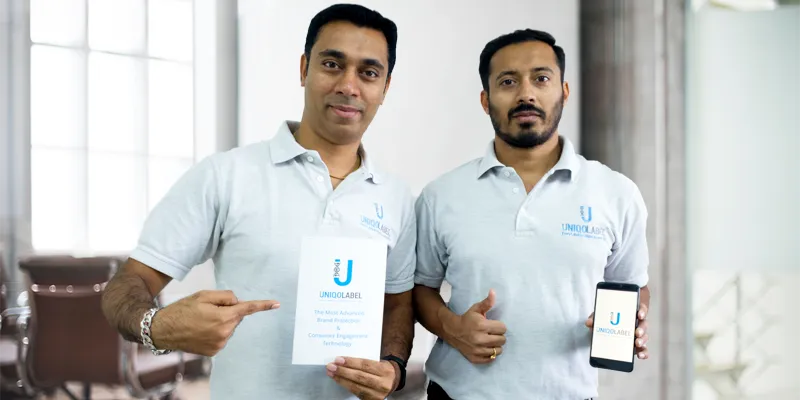No more counterfeits - Uniqolabel's security labels ensure genuine products, from maker to consumer
Incorporating hologram, machine learning and blockchain technologies, Uniqolabel tells customers if the product they ordered is authentic.
At one point or another, all of us have experienced the disappointment of being sold a counterfeit. In fact, according to the International Chamber of Commerce, the global fake products economy is worth a whopping $1.77 trillion.
To address this, Uniqolabel was born in 2016 in Bengaluru. Uniqolabel specialises in anti-counterfeiting technology. Its flagship product uses mobile, cryptography and computer vision tech to help brands in their supply chain.

“Lots of brands have gone out of business primarily because of fake goods. Consumers do not just get affected economically; fake medicines, baby powder, and seeds can damage lives,” notes Vikas Jain, the founder of Uniqolabel.
Countering the counterfeit
Uniqolabel incorporates a patented multi-layered security label for brands to include on the product or the packaging. The label has security elements like a tamper-evident hologram, a proprietary-always unique random 2D code, and a randomly generated security feature derived from natural entropy. Some labels also include a hidden code.
The label can then be verified in the supply chain or by the end consumer by using a smartphone-based application. On verification, the user is not only able to identify the authenticity of the product, but can also get to know the product’s details and origin. While users can download the Uniqolabel app from Play Store or App Store to verify the products, Uniqolabel also provides white-labeled applications and an SDK for companies that wish to have the app branded in their name.
Authenticity verification is the primary use case, but Uniqolabel also has customers that are using its solution to enable loyalty programmes, and for asset tracking.
The early days
Vikas Jain was born in a family of entrepreneurs. With a Master’s degree in Technology, Entrepreneurship and Venture Capital from the University of Maryland he worked as an associate at a venture capital firm. With a love for working with startups, Vikas joined Optimi and later Metrico. In 2013, he decided to come back to India and start his own venture. His brother, Dinesh, also saw a great opportunity in the space of anti-counterfeiting and given the family’s manufacturing and retailing experience, they decided to plunge head on.
Dinesh has been working with hologram security for the family business since 1999 but always felt a piece was missing to track the product to the end customer.
Uniqolabel's first pay cheque and beyond
Their first client - plywood manufacturer Kitply - came on board in 2017. Kitply was affected by counterfeiting, especially in the Chennai market. After using Uniqolabel's solution, it saw an increase in monthly revenue in Chennai alone by Rs 1.5 crore and an overall increase in monthly revenue by Rs 10 crore.
The founders have invested Rs 2 crore in the business and are cash-flow positive and don’t want to raise money as yet. Vikas says they have been profitable since day one and are expected to close this year with revenue upwards of Rs 3 crore.
Uniqolabel gets its revenues primarily from subscription fee (from enterprises) for its tech, and customers get a loyalty platform.
Thwarting the business of fakin’ it
The International Chamber of Commerce expects the anti-counterfeiting market to touch $206.57 billion by 2021. In India, the market is Rs 40,000 crore or $7.5 billion. Currently, most players in this market are security label providers, hologram makers and RFID players. Supply chain solutions like QR codes, scratch codes on top of simple labels haven’t been entirely effective in thwarting counterfeiting, or can only be verified once in the supply chain.
Unlike a majority of companies in this space, Uniqolabel has its own set up to design and make the labels that its customers use. This ensures complete security and protection from any pilferage. Alpha Lasertek, Holoflex, and Holostik are some of the Indian companies manufacturing hologram-based solutions. But Vikas notes that several solutions in the market do not let the end customers use their phones to verify that their boxes are not tampered with.
Uniqolabel has more than 40 customers now, including Epson, Tata Steel, Kitply, Dupont, Swisscore, Sorion, and is available in markets like India, Europe and South America. These are companies that sell steel, plastics, wood and other commodities. Uniqolabel also works with a couple of government agencies and universities to protect their assets and certificates. It has so far protected two crore products from counterfeiting.
Uniqolabel’s USP is its focus on R&D and being a cost-competitive product by keeping cost of adoption low. The company is launching an app called Paavn, which will enable consumers to search and report fake products and stores selling fake products. Vikas says that while they continue to innovate, they are looking at ramping up their sales and tech teams at present.







